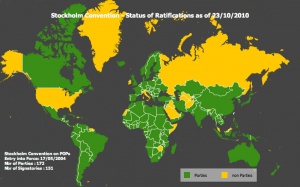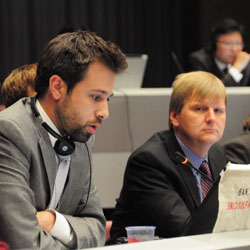Half a century ago, when the Soviets beat us into space with the launch of a satellite called Sputnik, we had no idea how we would beat them to the moon. The science wasn’t even there yet. NASA didn’t exist. But after investing in better research and education, we didn’t just surpass the Soviets; we unleashed a wave of innovation that created new industries and millions of new jobs. This is our generation’s Sputnik moment.
— President Barack Obama, State of the Union Address, January 25, 2011

Remember President Obama’s reference to this being our generations “Sputnik moment” when it comes to the U.S. asserting international leadership in the innovation of safer, cleaner technologies? Well, on Monday the Russian Federation beat us to the ratification of the Stockholm Convention on Persistent Organic Pollutants, leaving the United States as the lone superpower that has not ratified the treaty.
The Stockholm Convention on Persistent Organic Pollutants (POPs) (PDF)is global treaty that aims to eliminate a set of especially dangerous chemicals like dioxins, PCBs, and brominated flame retardants. To date, 174 nations have ratified the Stockholm POPs treaty, but the United States has not, pending necessary changes to the U.S. Toxic Substances Control Act (TSCA).
Senator Frank Lautenberg’s proposed overhaul of the woefully outdated 1976 TSCA could pave the way for the United States to join three important international treaties, according to CIEL’s latest publication: “U.S. Law and the Stockholm POPs Convention: Analysis of treaty-implementing provisions in pending legislation.”
If enacted, Sen. Lautenberg’s Safe Chemicals Act of 2011 would not just enable the United States to have a say in protecting Americans from POPs – chemicals that that are toxic, accumulate in living organisms, last for years, and can travel long distances through wind, water and other media. Rather, the proposed overhaul would enable the U.S. to lead international efforts. As a “nonparty,” the U.S. can officially only observe while allies and trading partners make important decisions.
 The Safe Chemicals Act provides an opening for the United States to reassert global leadership on POPs and other chemicals of international concern. The United States once led the way internationally. Now, unfortunately, the United States is often viewed now as a stumbling block, rather than champion, for effective global action on chemicals.
The Safe Chemicals Act provides an opening for the United States to reassert global leadership on POPs and other chemicals of international concern. The United States once led the way internationally. Now, unfortunately, the United States is often viewed now as a stumbling block, rather than champion, for effective global action on chemicals.
The Safe Chemicals Act allows EPA to take action on persistent, bioaccumulative and toxic chemicals (PBTs), which include POPs, whether or not these substances have been added to one of the POPs treaties. Under the 2011 bill, EPA is required to identify and take action on 20-30 PBTs, strengthening our hand in international negotiations to urge action by developed and developing countries alike. Thus far, only 22 chemicals have been added to the Stockholm Convention on POPs, many of which are no longer in production in the U.S. This feature of the 2011 bill is a substantial improvement over proposals in years past.
According to Daryl Ditz, Director of CIEL’s Chemicals Program, “there is nothing partisan about protecting Americans from these dangerous global pollutants.” The chemical industry is on record supporting U.S. ratification of the Stockholm Convention on POPs, yet they have yet to acknowledge this feature of the Senate proposal. By joining these treaties, the United States can improve the pace of progress, and help to boost demand for safer alternatives around the world—enabling another “Sputnik moment” for the U.S.
For more information, please contact Daryl Ditz or Baskut Tuncak at CIEL.
Map caption: Parties (green) and Non-Parties (yellow) to the Stockholm Convention (Russia is now a Party, as of June 27, 2011)



